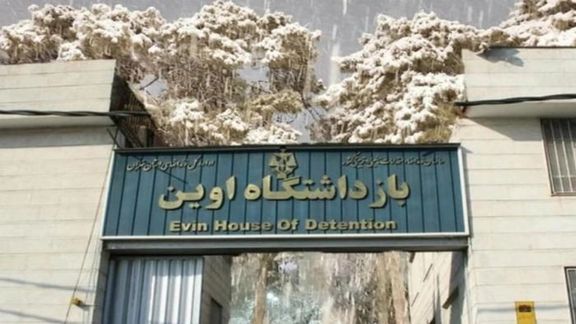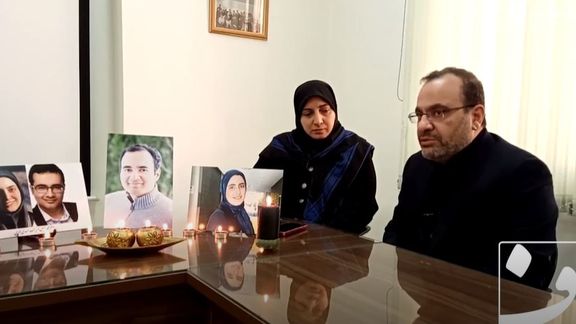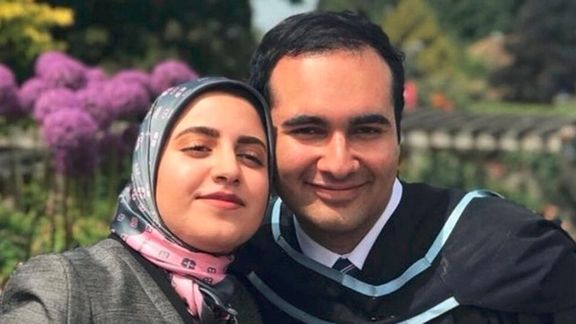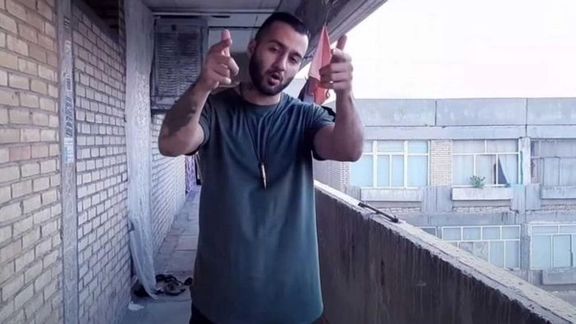Protestors Gather Outside Prison Ahead Of Feared Executions

Demonstrators have gathered outside a jail in Iran overnight ahead of the feared execution of three anti-government protesters.

Demonstrators have gathered outside a jail in Iran overnight ahead of the feared execution of three anti-government protesters.
Videos posted by activists show dozens chanting slogans in front of the Isfahan Central Prison, while gunfire was also heard. The clips also show thick smoke caused by tear gas.
Iranian authorities intend to execute Majid Kazemi, Saleh Mirhashmi, and Saeed Yaqoubi.
The three detainees received the death penalty in connection with an armed attack on November 16on “Isfahan House” neighborhood last year.
The Iranian authorities claim that two members of the security forces and a police officer were killed by protesters.
Campaigners say the three men were tortured into confessions, and there is no reliable evidence against them.
Amnesty International on Saturday spoke of its fears for the fate of the three detainees.
The international human rights organisation said: “Majid Kazemi, Saleh Mirhashemi and Saeed Yaghoubi are at imminent risk of execution at central Isfahan prison (also known as Dastgerd prison) after Iran’s Supreme Court upheld their unjust convictions and death sentences in early May 2023.”
After a wave of nationwide anti-government protests last year which has still yet to subside, the Iranian regime has embarked on a wave of executions which has seen dozens of prisoners hanged this year.
The regime used overwhelming force with military weapons in its crackdown on the protests, killing more than 500 civilians. Hundreds of other protestors suffered permanent injuries, including the loss of eyes when shotgun pellets were fired at the faces of demonstrators. More than 20,000 people were arrested.

Iran's judiciary has been building cases against dozens of independent lawyers for representing dissidents and supporting the Women, Life, Freedom movement.
Iran International has learned that summoning lawyers to the Prosecutor’s Office in Tehran, which started in March, resumed last week after a pause due to the relocation of the prosecutor in charge.
The judiciary’s intelligence organization, sources in Iran said, is behind the prosecution of these lawyers most of whom had expressed their support for the Women, Life, Freedom movement on social media.
The case involves 170 lawyers of whom, sources told Iran International, 27 individuals from different parts of the country have already been summoned by the Evin prison prosecutor on charges of “propaganda against the regime” and “assembly and collusion with the intention of acting against [national] security”.
Iran International has also learned that lawyers who were summoned were forced to sign a pledge that implies acceptance of the charges. One of the two lawyers who refused to sign the pledge was detained for a few hours and another one for a few days.
UK-based lawyer and women’s rights activist Samaneh Savadi told Iran International that the regime is taking revenge on lawyers, many among whom volunteered to represent protesters. She said that the attorneys are being punished “for standing beside the people”.
Ali Mojtahedzadeh, one of the summoned lawyers, told Etemad newspaper Sunday that most of these lawyers had participated in the protests or voiced support on social media. He said he and some of his colleagues had received the letter to present themselves to the prosecutor in the past few days.
He pointed out that the cases against most of these lawyers were dropped following Supreme Leader Ali Khamenei’s “amnesty”, but now new charges have been brought against them.
In February, Khamenei agreed to a proposal by Judiciary chief Gholam-Hossein Mohseni Ejei to pardon some prisoners and reduce sentences for those arrested during antigovernment protests last year. The move appeared to be designed to show clemency after hundreds were killed and around 20,000 arrested, and to rescue the image of the regime amid a grim economic crisis and mass public rejection of Khamenei’s rule.
Another lawyer, Mitra Izadifar, told Etemad that she is being prosecuted again, after being pardoned earlier. She added that she has been summoned to Tehran although she lives and practices in Mashhad.
Mohammad-Hadi Jafarpour who practices law in Shiraz also told Etemad “I was once arrested on November 2 on charges of ‘propaganda against the regime’ and ‘assembly and collusion with the intention of acting against [national] security. At the time, I was mostly questioned by prosecutors about my media commentaries, [Instagram] posts, and tweets… I had to sign a pledge in order to be pardoned [by Khamenei].”
He added that he has also been summoned to Tehran by the Evin prosecutor although despite a legal requirement that says he should be prosecuted in his own city. Jafarpour pointed out that the summons letter he received did not mention the charges.
Earlier in March a Revolutionary court permanently deprived prominent lawyer Nemat Ahmadi, a member of the Union Internationale des Avocats or International Association of Lawyers, from practicing law in Iran.
Ahmadi, a former professor of law sacked from Azad University for his political activities and representing political prisoners, was sued by the intelligence ministry for the same reason.
Dissidents and protesters are often deprived of their right to choose their own lawyers and must accept defense attorneys the judiciary appoints from a government-trusted list.

Father of two victims who died when Iran’s IRGC shot down a Ukrainian airliner says the regime still refuses to release documents proving the act it was intentional.
Dr. Mohsen Asadi-Lari, a former high-ranking health ministry official who lost both his children, Mohammad-Hossein and Zeinab, in the downing of the Ukrainian plane on January 8, 2020,told Didbaniran website Sunday that there is evidence the shooting was intentional, but the authorities would not release the evidence.
Iranian authorities who first claimed it was air crash due to a mechanical problem, three days after the incident admitted the plane was shot down with 176 people onboard, but insisted that it was due to human error.
Asadi-Lari said they asked the court to investigate the evidence proving that firing of two anti-air missiles at he plane was intentional and also demanded that the data to be released to them, but the court did not pay attention. He said that the information recorded on the plane’s flight recorder – known as the black box -- would definitively impact the final rulings.
He added that the conversations between the plane and the control tower can shed light on the circumstances of the missile attack. “We are sure that he deliberately triggered the attack and we have raised this in the court in different ways," he said about the missile operator.
Asadi-Lari added that the prime suspect in the case, identified as a Major Mehdi Khosravi, will be released in the near future because according to Iran’s laws he has spent about a third of his sentence. More than three years have passed since the incident and Khosravi was sentenced to 10 years in prison.

He claimed that Khosravi has been kept in solitary confinement since January 2020, saying, “Anyone familiar with Iran’s prison and judicial matters knows what it means to be in solitary confinement.” His remarks implicitly pointed to the fact that the regime does not want him to talk about the details of the incident.
“Compare the case of this plane with the case of the executed protestors, who were hanged for blocking a street or setting fire to a trash bin,” he said, adding that 176 innocent people were killed, and the culprit can go free after 40 months in prison.
Asadi-Lari clarified that the family do not seek execution for the officer because he was a service member and was doing his job, but they want the truth to be revealed.
Asadi-Lari and his wife Dr. Zahra Majd earlier insisted that the ten low-ranking military personnel on trial are not the real culprits. They claimed Khosravi was an expert in the Tor-M1 surface-to-air system that shot down the plane and that it was unbelievable that he had made the decision based by error.
Ukraine's flight PS752 was shot down on January 8, 2020, as it took off from Tehran’s Imam Khomeini International Airport. Only hours earlier, the IRGC had fired more than a dozen missiles at Iraqi bases hosting US troops in retaliation for the killing of the IRGC Qods Force Commander Qassem Soleimani by a targeted US drone strike just five days earlier.
Despite expecting retaliation from the US, the IRGC which is responsible for air defense of the capital did not close the civilian airspace in the early morning hours of January 8.
Asadi-Lari and his wife, both professors at Iran Medical Sciences University, say the whole family, including their two children who were students in Canadian universities, were devastated by Soleimani's killing and were very worried about a US retaliation for Iran's missile attack while the family was on their way to the airport. Before the flight took off, their son Mohammad-Hossein had been praying for Soleimani who was buried the day before.
Unlike parents and family members of many other victims of the tragedy, the Asadi-Lari family are not members of the Canada-based association representing victims' families. The association does not recognize the eligibility of the Islamic Republic's Judiciary for investigating the incident and has repeatedly called for top Iranian officials, including Supreme Leader Ali Khamenei, as commander-in-chief of the Armed Forces, to be held responsible.

Iranians abroad are holding rallies across Europe and America in support of rapper Toomaj Salehi and other political prisoners.
After a demonstration in the US on Saturday, protests took place on Sunday in London, Paris, Stuttgart and Antwerp and other European cities. A rally is also planned in Toronto, Canada.
At Saturday’s rally in Washington DC, protestors called for the release of political prisoners, including dissent rapper Toomaj Salehi. They also chanted slogans demanding an end to Iran’s current bloodthirsty execution spree.
In Iran, protestors expressed support for Salehi by putting up his pictures on walls in Tehran and the Kurdish city of Sanandaj.
Salehi is known for his protest songs about Iran's social issues and injustice by the government. He was arrested on October 30 as part of the crackdown on opponents.
His arrest came shortly after an interview with the Canadian Broadcasting Corporation in which he said: “You are dealing with a mafia that is ready to kill the entire nation... in order to keep its power, money and weapons.”
In his politically charged songs such as “Buy a Rat Hole” (2021), Toomaj, a 32-year-old metalworker in Esfahan, speaks out against repression, injustice, poverty, and the authorities’ own corruption and impunity from prosecution.
The 33-year-old singer is one of dozens of members of the artistic and entertainment community who have been arrested since protests surged across Iran last year as the regime struggles to contain widespread discontent.

A French citizen released by Iran after three years in jail on trumped-up spying charges is “very weak”, his family have revealed.
President Emmanuel Macron announced on Friday that Benjamin Brière is going free along with fellow Frenchman Bernard Phelan.
The two men are among an unknown numbers of diplomatic hostages held by the regime.
In a statement on Friday, Briere’s family spoke of being able “to hold him in our arms after three years of hell," but added: “He is, however, very weak, physically and morally, a return to normal life will be long and certainly difficult, but now he is in good hands."
A lawyer for Briere said he had become “extremely weak and frail” after a hunger strike, adding: “If the release wouldn’t have happened by now, Benjamin would be at a major life risk.”
Macron tweeted: "We will continue to work towards the return of those of our fellow nationals who are still detained in Iran."
Brière had been held in Iran since May 2020. The traveller and blogger was arrested for allegedly taking photos with a drone in a restricted area near the Turkmenistan-Iran border and sentenced to eight years in jail.
Philippe Valent, his France-based lawyer, called the espionage charges against his client a "fiction" and his trial "a parody staged by the Revolutionary Guard".
Ties between France and Iran have deteriorated in recent months. Tehran had detained seven French nationals in what Paris described as arbitrary arrests equivalent to state hostage-taking.
In the past decade, Iran's Revolutionary Guard have arrested dozens of dual nationals and foreigners, mostly on unproven allegations of espionage and breach of security.

An Iranian protester, who was shot during last year's protests in the southwestern city of Izeh, is being kept in prison despite having a shotgun pellet in his eye.
Vahid Abbasi, is one of eight people arrested during Iran’s nationwide protests following the death in custody of Mahsa Amini last September.
They were indicted for "waging war against God" and "corruption on earth" that can lead to death sentences.
In April, the regime sentenced a protester named Abbas (Mojahed) Kourkour to death for the killing of nine-year-old Kian Falakpour during unrest in November, although the victim’s family insists he is innocent.
Kian and his family were targeted by plainclothesmen during a night of protests in Izeh while they were in their car. Kian’s father was also paralyzed as a result of serious injuries he sustained during the attack.
Abbasi, who had a cafe in the city, was also a football player. He was shot in the eye by government agents on November 25 and then taken to a hospital in Ahvaz, but was arrested three days later when the security agents stormed the clinic.
The young man was transferred to Shiban prison in Ahvaz 20 days later and since then he has been in difficult conditions.
On the one hand, judiciary officials and prison authorities do not give a clear answer to the family who cannot afford to hire experienced lawyers.
This comes as he is in a critical condition due to the bullet injury and needs treatment in a hospital, but the judiciary officials do not allow him to undergo medical treatment.